

The Grounds Report:
A Conversation with Gene Jacobson
Interview by Rosa Jimenez, Editor of Westwind

![]() Note:
In 1979 I was an academy junior and I needed a job. A friend told me the college
Grounds Department was hiring and that I should look up Gene Jacobson. I remember
tracking him down at what was then known as the Industrial Technology Center,
where he and the grounds crew were planting trees and laying sod in the front
of the new building. I asked for a job and he gave one to me on the spot.
I ended up working for Grounds until my junior year in college. Although I
would intersperse other odd jobs during these years, on Grounds I found as
many hours of work as I needed, a love of working outside, but most of all,
many great friends--always a top priority for a college student. I interviewed
Gene in his office--characteristically cluttered and with fine layers of dust
throughout. His office is still in an upper level room overlooking the Grounds
Shop.
Note:
In 1979 I was an academy junior and I needed a job. A friend told me the college
Grounds Department was hiring and that I should look up Gene Jacobson. I remember
tracking him down at what was then known as the Industrial Technology Center,
where he and the grounds crew were planting trees and laying sod in the front
of the new building. I asked for a job and he gave one to me on the spot.
I ended up working for Grounds until my junior year in college. Although I
would intersperse other odd jobs during these years, on Grounds I found as
many hours of work as I needed, a love of working outside, but most of all,
many great friends--always a top priority for a college student. I interviewed
Gene in his office--characteristically cluttered and with fine layers of dust
throughout. His office is still in an upper level room overlooking the Grounds
Shop.
Rosa: Before I ask you about your work, let me ask about
you. When I worked for you, you didn’t have any kids. Now you have two
and even a grandson who you like to show pictures of. Hard to believe, huh?
How old is he?
Gene: He’s two or going to turn two in just
a couple days. In fact we’re going to go see him this weekend.
R: Tell me about your wife. Not everybody knows who she
is.
G: Her name is Linda. We were married December
23, 1989, in Grand Cayman island, on a Maranatha project.
R: The kids were how old when you became their dad?
G: Eight and eleven. Now Sarah is a junior nursing
student at the community college and Aaron has his own business here doing
Venetian blinds.
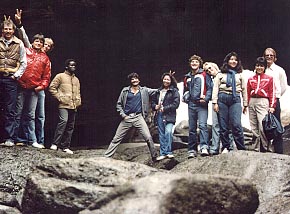
![]() R:
So do you and Linda plan on staying in the area for a while?
R:
So do you and Linda plan on staying in the area for a while?
G: I think so.
R: How long have you worked at Grounds?
G:
I’ve worked here for 25 years. Started in June of 1977. When I look back
it just seems like a moment since then. I see old kids that used to work for
me, and you know, I think it’s only been five or six years but it’ll
have been 20 years since they worked for me.
R: Like me for instance. I think I worked last in 1983.
That would be about 20 years.
G: Isn’t that something.
R: It’s strange. But that’s the way it goes.
I noticed that you were at the WWVA Alumni Reunion (Walla Walla Valley Academy).
G: Yes, I had my 30-year reunion this weekend.
(laughs)
R: That’s what reunions are for. To remind you how
old you are. Well, who are some of the grounds alumni you’ve seen lately?
People who haven’t seen in a long time.
G: Well, this spring we had a grounds reunion.
I think we had about 75 people.
It was really good to see some of those kids I haven’t seen
in a long, long time. People like Brenda Baer, Sue and Kevin Watters. Sue
Beckner and her brother David.
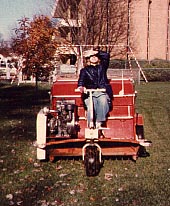
![]() R:
During dinner, who was it that called you from Australia?
R:
During dinner, who was it that called you from Australia?
G: Colleen Penchin. She was the wife of one of
our math teachers who was here as an exchange teacher. She called to wish
me luck and happiness.
R: How many people have worked for you over the years?
G: Almost a thousand kids have worked for me
in 25 years. No matter where I go I’ll find someone that I know, or someone
who knows somebody that I know. Just this fall I went on a pack trip with
three other guys up in Canada. I started talking to one of the guys that was
with us. He was an older gentleman, and he started naming off guys that I
knew. So, it’s a small world, especially in the Adventist community.
R: Speaking of packing, are you still a horseman?
G: I love horsepacking. I try to go two to three,
four times a year. I’ve been all over. I’ve been in Banff National
Park five times and seen grizzly, moose, caribou, elk and deer. I’ve
been up in Canada and the Wallowas a lot.
R: Do you still do cowboy camp meeting?
G: Every Fourth of July weekend we have a cowboy
camp meeting. I helped start that. And I’ve been to every single one
of them, the only one in the whole outfit that’s been to every one. We
plan our vacation around our cowboy camp meeting. Horses have been a real
blessing for our family. Our kids love to do them, and it’s been something
we can do as a family.
R: So do you still say “boy howdy?”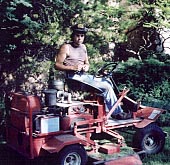
![]()
G: Boy howdy! Cotton pick! (laughing)
R: Sorry! (laughing) I had throw that in there for those
of us who remember your colorful expressions. Anyway, I always thought it
was great that you were into horses. I remember you did a lot of riding during
the summer. Do you still take your grounds crew on a summer trip?
G:
No. We had to give that up. The kids have so many other interests. I mean
I could get three or four, but not enough people would want to go to make
it worth the effort.
R: In the past we had some great outings.
G: Yes we did. We’ve gone to Banff National
Park, Lake Louise, Victoria, the Oregon Coast, Dworshak Dam—canoeing
on the reservoir. We also went to Yellowstone and Glacier National Park. A
lot of good times.
R: What are some of the differences you’ve seen
in the students you’ve employed over the past 25 years?
G: Well, when I first started it seemed like
we got more farm kids. More of the kids had experience working outside. And
then the labor laws have changed such that younger kids can’t learn how
to work. It’s a real challenge to teach them and we strive to do that.
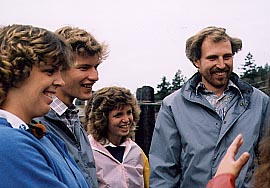
![]() R:
What are the types of things you find yourself doing now to help them?
R:
What are the types of things you find yourself doing now to help them?
G: It’s more hands on than it used to be.
I have to be with them to guide and show them how to do things. People haven’t
driven tractors or they don’t know how to drive a truck or back out of
a place using just mirrors. Things like that. I’ve had people that come
that don’t even know how to drive a stick shift. But now our vehicles
are automatics. We just let go of our last manual vehicle a couple of months
ago.
R: What are some of the other major changes that have
changed the way you work? For instance I remember the major transition to
automatic sprinklers. Is there anyplace that there are not automatic sprinklers
?
G: Very few. Sittner Field does not have automatic
sprinklers. Then there is the very west end of the P.E. field, but other than
that everything is pretty well automatic.
R: That made a big difference hasn’t it?
G: It’s made a huge difference. It let me
use my students elsewhere. For instance, we can put in more flowers. When
I started I wanted to put in more color on campus so I put in big new landscape
beds. That also helped with the mowing. Our big mowers can get in and zip
around so we don’t have to do as much hand mowing.
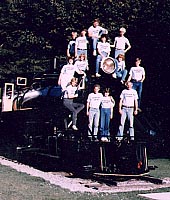
![]() R:
How many thousands of flowers do you plant every year?
R:
How many thousands of flowers do you plant every year?
G: We put in twelve to 15,000 plants per year
of annuals. The reason I use annuals is because they’re so colorful all
summer long. Perennial are okay, and there are some beautiful perennial, but
they just don’t last like the annuals do. Community people come up to
me all the time and compliment us on how beautiful this campus is.
R: What’s been your favorite project--the one you’ve
been most proud of during the time you’ve been here?
G: Probably Rosario. A few years ago we started
the renovation project up there. I helped a lot with the infrastructure--putting
sewer and water lines in. I also helped put the tanks in, build an RV park,
logging to clear off lands, so we could put the drain field in. And we tore
down buildings and cleaned up. I’d go over two weeks at a time and it
took about three years. I was at Rosario part-time, plus I was running this
crew over here at the same time so it was quite a challenge.
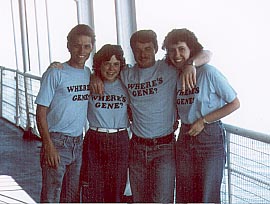
![]() R:
I imagine part of the reason you like going to Rosario is that you have a
personal connection with it.
R:
I imagine part of the reason you like going to Rosario is that you have a
personal connection with it.
G: I do. I took biology in college and I spent
a summer there. And once a person has spent some time at Rosario it becomes
a part of you. The aura and the atmosphere are so unique. It’s a small
enough group of students that are there, so you develop a real rapport with
everyone there. You become like a family.
R: So after all these years, do you see that still happening
with students that are there?
G: I do.
R: Now what about favorite projects on the main campus?
G: Some of my favorite projects have been building
the parking lots and getting in landscapes. Every year we do something new
to improve the campus landscape. There’s great satisfaction in taking
something that’s seedy-looking and not so good and turning it into something
of beauty. That’s a witness for this school.
R: What are some big projects you are working on right
now?
G: We just finished new landscaping around Smith
Hall and now we are working on the new parking lot behind the technology building.
Our next big project will probably be new landscaping around Bowers Hall.
And I’ve still got some more landscaping or plants to put in around the
Fine Arts Center and Chan Shun here and there. We’ve had our moments
of not such great things too. We lost a few trees out in the alumni parking
lot. We got some fire blight that hadn’t been through in 60 or 70 years
and it took a few of my trees out. So I’m going to have to replant those.
It’s part of the challenge.
R: What’s the worst disaster that ever happened
on campus here that you had to deal with?
G: I
suppose Columbia Auditorium burning down. I was working on grounds at that
time. I helped clean up. Even now we still have effects of the fire because
some of the garbage was buried underneath the alumni lawn and its caused some
sinking. That’s why you’ll see puddles up in some areas.
R: I was wondering about that because it’s usually
the lawn I cut across to get to the main campus. Ooops... I know I’m
not supposed to do that...
G: Now Rosa...
R: But I can’t help it. There’s no direct sidewalk
from where I am. Well, enough of the disasters and people making paths across
the nice lawns...What do you enjoy the most about your work?
G: It is been really fun working with the students.
I enjoy the camaraderie we have. We have a good time here working and getting
to know new people. There are those moments when you have to deal with somebody
who isn’t doing what they’re supposed to, but overall, it’s
really been a blessing.
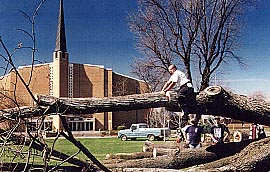
![]() R:
I understand you have been kind of a father figure to some people and for
one girl in particular. You participated in her wedding and, as they say,
gave her
R:
I understand you have been kind of a father figure to some people and for
one girl in particular. You participated in her wedding and, as they say,
gave her
away.
G: That was a special moment. Being able to help
her grow and get her life turned around, get her through school and now she’s
a professor.
R: That’s great. Any other people that you feel
as if you’ve been blessed to be able to help in some way?
G: Yes, there was Steve Arrell. He was an older
guy and had a family. Steve had led a rough life. He was a rock musician and
had been into drugs and alcohol. I met him through one of my old academy teachers
who one day called me up and said ‘Hey, I’ve got a guy that just
been baptized two weeks ago and he needs a job. He wants to come be a teacher.’
I said sure, send him by. And so I put him out to work.
For his first job I sent him to go hoe some weeds out of a softball field.
I gave him a hoe and few minutes later, he comes back with two pieces of hoe.
(laughs)
So, I thought, well that didn’t work. So I showed him how
to use it a little better and sent him out again with a new hoe. He came back
again with two pieces of hoe. The poor guy had blisters on his hands. Steve
was used to making 75 to 80 bucks an hour as a hypnotist therapist and then
he came to work for me for four bucks and hour, or something like that.
R: A humbling change.
G: It must have been really a low blow. Anyway,
I ended up finally giving him a shovel. I knew he couldn’t break that.
(laughs) He finally got the job done.
R: Any other Steve stories?
G: Another time, I had him on the tractor that
had a lawnmower behind it. He was mowing at Walla Walla Valley Academy. I
stepped up to talk to him, putting my foot just right in front of the tire.
He had had his foot on the clutch but hadn’t taken it out of gear. When
I was talking to him his foot slipped off the clutch and of course it freaked
him out and he slammed on the clutch and there he sits--the back tires of
the tractor right on my toes.
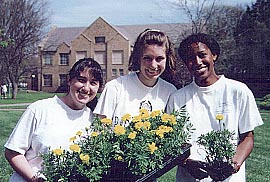
![]() R:
Did he know that the tire was on your foot?
R:
Did he know that the tire was on your foot?
G: Yeah, he did. He was fumbling around so he
killed the motor and had start it up again. When Steve died his wife asked
me to tell that story at his eulogy. It was a real privilege to be able to
go and tell people what Steve meant, because he meant a lot to me. That’s
the thing about these students. They change my life. Every single student
changes my life. Even as I maybe change their lives. I enjoy enjoy helping
them. They just mean something special to me.
R: Steve did finish school, right?
G: Steve graduated with a degree and became a
teacher. He taught at Stateline School and then went to teach at a public
school in Portland. One day he woke up, sat up in bed and had a heart attack
and died. He had only been out of college about 10 years.
R: In that time we just don’t know how many people
he affected.
G: That’s right. I know he sure helped some
of the students he worked with right here. He could relate to some of them
in ways that I couldn’t relate to.
R: That’s right. And he was extremely funny. I remember
his stories which still make me laugh when I think about them.
G: Oh, he was just a card. He always had us in
stitches. I will never forget him. Whenever you come in contact with somebody,
when you actually get to really know people, they become a part of you.
R: Well, as always, you never seem to lose your enthusiasm
for your work.
G: No, I love my work. It’s a challenge
everyday and it’s fun. I couldn’t think of anything I’d rather
do.
Note: Want to send Gene a message? Send an e-mail to jacoge@wwc.edu